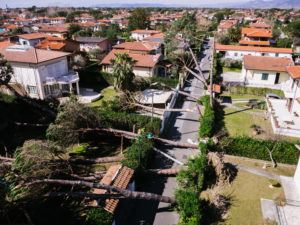According to Mothers Against Drunk Driving, natural disasters like hurricanes Harvey and Maria can increase substance abuse. Researchers have found an increase in the number of people hospitalized for substance abuse following major natural disasters. With more people using substances, the risk of drunk driving can also increase. Higher levels of drinking mean that more people might be drunk on the road. Sadly, it’s just a matter of numbers before someone gets hurt.
But why? Trauma is known to increase a person’s risk for substance abuse and use. The stress of losing a home or a loved one, coupled with the loss of important community resources can make it difficult for individuals to find healthy ways to cope. In the aftermath of a major storm, fire, or flooding event, individuals may struggle to pick up the pieces. Communities may be shattered. Social connections that may have once been strong may fray. Lack of strong social ties has been linked to substance abuse issues.
While there are certainly resources available to help individuals cope, not all individuals seek them out. If you or a loved one has survived a natural disaster and is suffering from stress or trauma, help is available. Suicide hotlines can connect you with low-cost, sliding scale, or even free substance abuse community treatment programs and help.
Unfortunately, when individuals choose to drink and drive or drive while under the influence of drugs or alcohol, the people who suffer the most are often those who were innocent victims. Driving in a natural disaster is tough enough, but when you combine flooding, wreckage, fallen trees, and other damage with drivers who are not fully present behind the wheel, you have a recipe for disaster.
The concern about driving during natural disasters is so great that the Centers for Disease Control recently released information about driving safely during a natural disaster. What can you do to stay safe? For one, use your seat belt, and obey all posted speed limits. However, it is important to understand that posted speed limits may still be too fast for conditions. Drive as slowly as you feel you need to be safe. If lights are not working, intersections should be treated like four-way stop signs. When in doubt, stop.
If you can avoid driving on roadways right after a major storm, do so. Driving through standing water or areas with debris can be dangerous. This is why it is important to plan your route. Some local municipalities post road closures or problems online. Do your research before you head out.
Finally, if you or a loved one was hurt due to a drunk driver or was injured due to the negligent or neglectful action of another driver, know your rights. The Law Offices of Robert Gregg are car accident lawyers in Dallas, Texas who work with individuals and families who have been impacted by crashes. Our firm can speak to insurance adjusters, negligent parties, and other stakeholders to help you seek compensation for your medical expenses, lost wages, and pain and suffering. Drunk driving impacts us all. Seek justice today.


